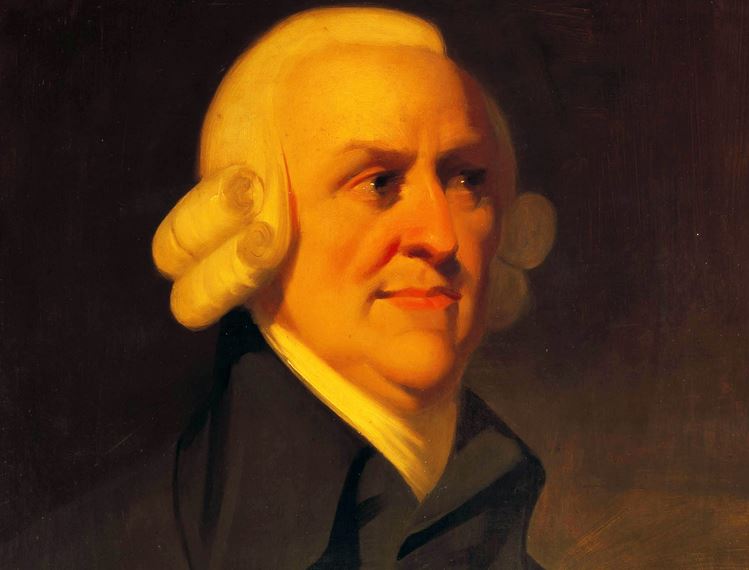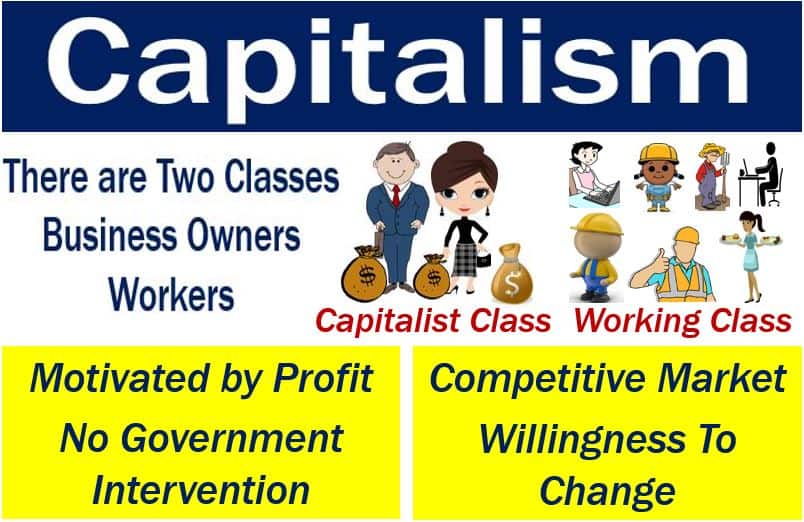What is Capitalism? Definition and meaning
Capitalism is an economic system in which people and companies sell products and services in a free market. In this system, assets belong to private entities rather than the state. The terms ‘capitalist system’ and ‘capitalistic system’ mean the same as capitalism. Capital, in its true sense, refers to the means of production.
Capital assets are things that a company needs to produce its goods. For example, machinery, computer equipment and vehicles are capital assets.
The capitalist system encourages open competition and private investment instead of government ownership and control. A good example of a country that has a capitalist system is the United States.
A transaction in a capitalistic economy allows buyers and sellers to agree on the prices of goods and services.
According to Oxford Dictionaries, capitalism is:
“An economic and political system in which a country’s trade and industry are controlled by private owners for profit, rather than by the state.”

The free-market system has existed for hundreds of years. It became the most popular economic system in the Western world after the end of feudalism. The capitalistic system is now the most dominant economic system in the world.
The word ‘capitalist’ comes from the word capital, which derived from ‘capitale’, a late Latin word which evolved from the root word ‘caput,’ meaning ‘head.’
Capitalism – private individuals own assets
In a capitalist system, private individuals own assets. Companies get their labor-force by offering jobs with wages.
However, not all capitalists system are the same. They exist in various forms.In fact, each form has different levels of public capital control. Below are some examples:
– Laissez-Faire Capitalism is a system in which the economic market is completely free from government restrictions. There are neither tariffs nor subsidies. In other words, the private sector runs the economy.
– Welfare Capitalism refers to capitalistic economies that provide welfare services to employees. Most Western democracies follow this system.
– State Capitalism is a type of capitalist system in which the government controls most of the capital and industry.
Capitalism is the opposite of socialism In a socialist system, there is social ownership of production. However, some purists dispute this comparison. They say that as capital is the means of production, even communist systems are capitalists.
In other words, purists see the state and private sectors as capital owners in the socialist and capitalist systems respectively.
Supporters of the capitalist system believe it is the best wealth-producing system. Critics, on the other hand, claim that the capitalist system causes economic instability. They argue that it is not in the best interest of all the people.
Many people believe that capitalism creates widening inequality. In other words, critics claim that in a capitalist system, the rich get richer while the poor get poorer.

Pure capitalism vs. mixed economies
Most Western nations believe they have entirely capitalist systems. However, they are not. They are, in fact, mixed economies. In other words, they have a combined system of markets and centralized economic planning.
All the Western democracies have certain degrees of central planning. There is also private enterprise, which contributes to their GDPs and employment. GDP stands for Gross Domestic Product.
When the 2008 global financial crisis of 2008 struck, governments in North America and Europe bailed out their major banks. In fact, they spent trillions of dollars saving those companies. In a truly capitalist system, this would not have happened.
Bailouts not part of capitalism
In a capitalist society; we would have let those failing banks die. Subsequently, new ones would have taken their place.
By bailing out failing companies, governments prevented capitalism’s greatest advantage from occurring. We call this advantage ‘creative destruction.’ In a capitalist system, old and inefficient systems die and new ones take their place.
If you do not allow the failing companies to die, you prevent new ones from emerging.

Joseph Alois Schumpeter (1883-1950), an Austrian-American economist and political scientist, wrote:
“[creative destruction is] the process of industrial mutation that incessantly revolutionizes the economic structure from within, incessantly destroying the old one, incessantly creating a new one.”
By supporting companies that had failed, governments had done two things, critics claimed:
1. They had destroyed competition. New entrepreneurs with new ideas and energy were unable to compete. These new businesses may have had the ability to change and improve products. In other words, the failing companies had been given an unfair advantage.
2. The bad business behaviors which got the companies into trouble continued. They continued due to the bailouts. If I know that bad behaviors have no consequences, I will continue behaving badly. They are no negative consequences because I know there will be bail outs. In other words, I will continue doing things which caused the company’s downfall.
According to Merriam-webster.Com, the word capitalist has two meanings today:
“A person who has a lot of money, property, etc., and who uses those things to produce more money,” and “a person who believes that capitalism is the best kind of economic system.”

